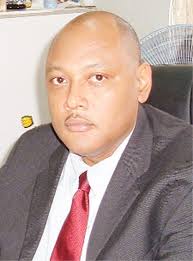
THE political gridlock that dogged the proceedings of the National Assembly in 2013 has left the Government dissatisfied with the level of progress it achieved in advancing its legislative agenda.
Attorney General Anil Nandlall, at a press conference held on Monday at Freedom House, said: “No one in the PPP (People’s Progressive Party) can say we are satisfied.”
Parliament has lost its focus and is being used by the Opposition as an instrument to advance political causes, he opined.
“Parliament has been used repeatedly as a forum to extract political gains…one must be disappointed in the use of Parliament,” he declared.
The AG said rejection of the “people’s voice” in moves made to reject petitions from the private sector and stakeholders in the cricket field was also a source of disappointment.
He argued that the petitions were not rejected on the basis of their merit, but because of other considerations.
The use of the one-seat majority, Nandlall said, was another source of contention.
The AG said that misuse of the majority reflected an authoritarian style that bore resemblance to governance in the pre-1992 years.
ENCROACHMENT

He added that there are “constant and relentless” attempts to exceed the powers of the Legislature and encroach on the functional responsibilities of the Executive.
The AG said: “Last year we saw a series of motions moved by Mr. Carl Greenidge and Mr. Khemraj Ramjattan seeking to direct certain ministers to do things, things that are inconsistent with the law and the Constitution.”
Nandlall pointed to more recent acts, including the call for Minister Robert Persaud’s resignation and the motion to have Finance Minister, Dr. Ashni Singh, appear before a Privileges Committee.
He said the House has no power to censor a member of the Executive in the discharge of Executive functions.
“The Parliament has jurisdiction over the conduct of its members over the proceedings of the House, but it has no jurisdiction, no power and no responsibility to censor a minister with respect to the Executive functions of the minister.
“All these are trespasses committed into the province of the Executive by the National Assembly seeking to expand their (the Opposition’s) role as they continue on the path of political vendetta. That is what the Parliament is being used for…this can never be the role conceived for the Parliament.”
He made it clear that the National Assembly has to serve the interest of the Guyanese people.
“A Parliament is the place where the ultimate objective is to act in the interest of the people, not to penalise the people,” Nandlall said.
General Secretary of the ruling party, Mr Clement Rohee, added: “The Opposition MPs appear to want to run the Government from the Parliament. This is a total misconstrued view on the role of Parliament vis-à-vis the Executive.
“Someone seems to have convinced them, or they seem to have convinced themselves, that the Parliament can give direction to the Executive.”
Rohee termed this a governance challenge, and stressed the need for “political compromise” going into 2014. This, he said, has been called for since Cheddi Jagan was Head of State, and throughout the time of the ruling party’s majority in the National Assembly.
He said the legislative agenda for the New Year is already being worked on.
HIGH POINT
Both Government Members of Parliament agreed that, despite the challenges this year, there were some high points.
The AG noted the Speaker’s ruling following the Opposition no-confidence motion in Minister Rohee. Speaker Trotman ruled that Rohee would be allowed to participate fully in the business of the National Assembly and be unhindered in the execution of duties, both as an elected Member of Parliament and as the individual designated by the President to be the Home Affairs Minister.
Trotman had said: “It is my considered opinion that refusing the right to a minister to address the House is tantamount to refusing the President the right to speak in the House — a very unconstitutional and untenable situation”.
Nandlall said the number of questions, in the hundreds, tabled in the House was another high point. He added that none went unanswered.
Rohee said the experience gained from working in the new dispensation in the National Assembly was another high point, as it provided the basis for advancing proceedings under different circumstances.
Both men agreed that moving into 2014 will not be without challenges, but they also agreed that consensus – which has been proven possible in the absence of political plays – must be the focus of Parliamentarians. (Taken from Chronicle)



